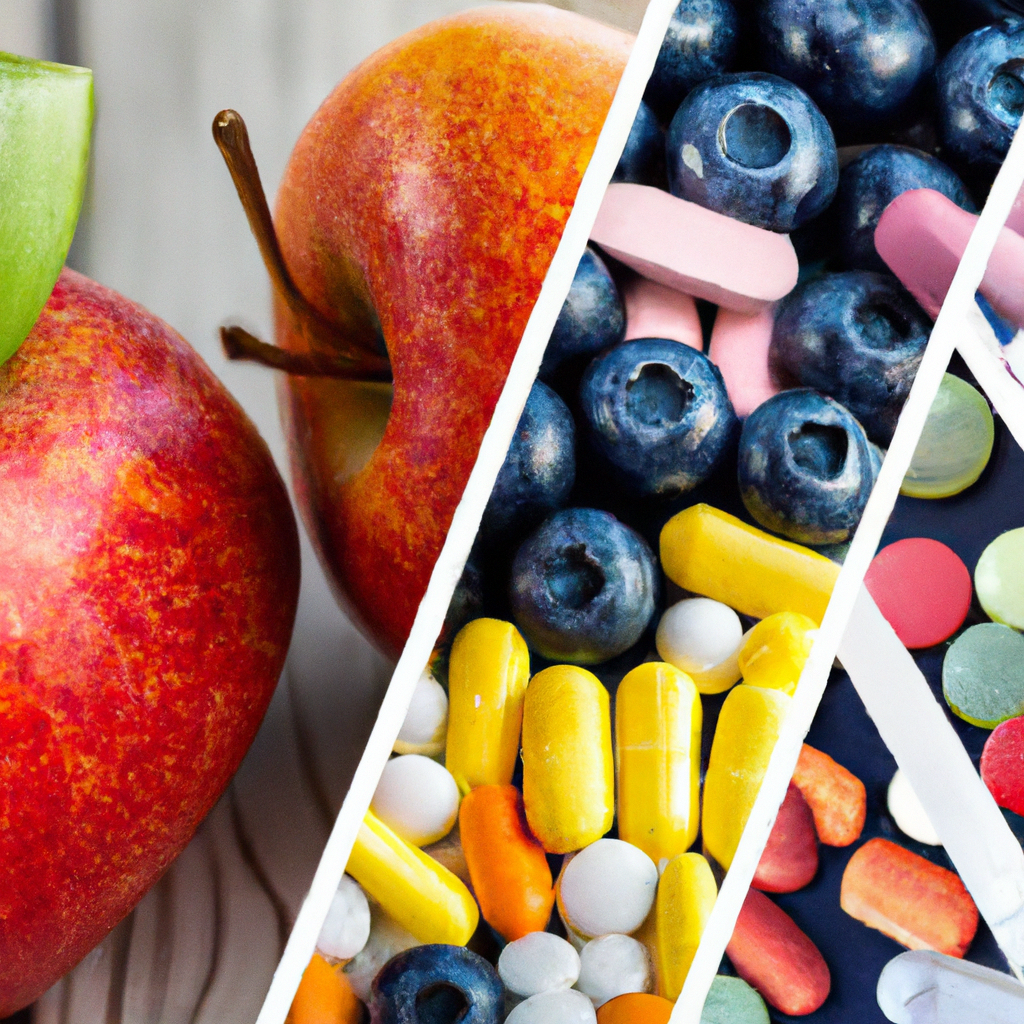Are you looking for simple and effective ways to enhance your overall well-being? Look no further! This article will provide you with an insight into the world of daily supplements tailored specifically for women’s health. Discover the incredible benefits these supplements can offer and how they can support your body in maintaining optimal health and vitality. Embrace a healthier lifestyle today with the help of these daily supplements!
Hormonal Health
Vitamin D
Vitamin D is an essential nutrient for maintaining hormonal health. It plays a crucial role in regulating the production of hormones in the body. Vitamin D deficiency has been linked to various hormonal imbalances, including irregular menstrual cycles, low estrogen levels, and mood swings. By ensuring an adequate intake of Vitamin D through supplementation, you can support your hormonal health and promote overall well-being.
Evening Primrose Oil
Evening Primrose Oil is a popular supplement known for its potential benefits in hormonal health. It is rich in gamma-linolenic acid (GLA), an omega-6 fatty acid that is involved in the production of hormones in the body. Evening Primrose Oil has been used to alleviate symptoms of hormonal imbalances, such as PMS and menopausal symptoms. Adding this supplement to your daily routine may help support hormonal balance and relieve associated discomfort.
Black Cohosh
Black Cohosh is another natural supplement known for its potential effects on hormonal health. It has been traditionally used to alleviate symptoms of menopause, such as hot flashes, mood swings, and sleep disturbances. Black Cohosh contains compounds that act similarly to estrogen in the body, making it a popular choice for women experiencing hormonal imbalances. Adding Black Cohosh to your daily supplement regimen may help promote hormonal balance and improve overall well-being.
Bone Health
Calcium
Calcium is essential for maintaining strong and healthy bones. It is a vital mineral that plays a crucial role in bone formation and density. Women are particularly at risk of developing osteoporosis, a condition characterized by weak and brittle bones, due to hormonal changes during menopause. By ensuring an adequate intake of calcium through supplementation, you can support your bone health and reduce the risk of osteoporosis.
Vitamin D
Vitamin D is not only important for hormonal health but also plays a significant role in bone health. It helps the body absorb calcium from the diet and facilitates its incorporation into the bones. Vitamin D deficiency has been linked to decreased bone density and increased risk of fractures. Therefore, it is crucial to supplement with Vitamin D to ensure optimal bone health and prevent conditions like osteoporosis.
Magnesium
Magnesium is another essential mineral for maintaining healthy bones. It works in conjunction with calcium and Vitamin D to support bone density and strength. Magnesium deficiency has been associated with decreased bone mineral density and increased risk of fractures. By including magnesium supplementation in your daily routine, you can support your bone health and reduce the risk of osteoporosis.
Vitamin K
Vitamin K is necessary for proper bone mineralization and metabolism. It aids in the synthesis of proteins that are essential for bone health. Vitamin K deficiency has been linked to increased risk of fractures and decreased bone density. Adding Vitamin K supplementation to your daily routine can help support your bone health and contribute to strong and healthy bones.
Boron
Boron is a trace mineral that plays a role in maintaining healthy bones. It influences calcium metabolism and helps prevent calcium loss from the bones. Boron supplementation has been shown to contribute to improved bone health and reduced risk of osteoporosis. Including boron in your daily supplement regimen can support your bone health and overall well-being.

Heart Health
Omega-3 Fatty Acids
Omega-3 fatty acids are beneficial for heart health. They help reduce inflammation, lower blood pressure, and decrease the risk of heart disease. Omega-3 fatty acids, such as EPA and DHA, are found in fatty fish like salmon and mackerel. However, it can be challenging to obtain sufficient amounts through diet alone. Therefore, supplementing with omega-3 fatty acids can be a convenient way to support your heart health and maintain optimal cardiovascular function.
Coenzyme Q10
Coenzyme Q10 is a nutrient that plays a crucial role in cellular energy production. It is also a powerful antioxidant that helps protect cells from damage. Coenzyme Q10 levels tend to decrease with age, and deficiencies have been associated with cardiovascular problems. By supplementing with Coenzyme Q10, you can support your heart health and improve overall cardiovascular function.
Folic Acid
Folic acid, also known as Vitamin B9, is essential for heart health. It helps reduce levels of homocysteine, an amino acid associated with an increased risk of heart disease. Folic acid also supports proper red blood cell formation and oxygen delivery throughout the body. By including folic acid supplementation in your daily routine, you can support your heart health and reduce the risk of cardiovascular problems.
Reproductive Health
Iron
Iron is a crucial mineral for maintaining reproductive health. It is necessary for the production of hemoglobin, a protein that carries oxygen to different parts of the body, including the reproductive organs. Iron deficiency can lead to anemia and menstrual irregularities. Supplementing with iron can help ensure an adequate supply of this essential mineral, supporting your reproductive health and overall well-being.
Folic Acid
Folic acid plays a vital role in reproductive health, particularly during pregnancy. It is crucial for proper fetal development, as it helps prevent neural tube defects in the baby. Folic acid is also important for female reproductive health, supporting healthy ovulation and fertility. By including folic acid supplementation in your daily routine, you can support your reproductive health and increase the chances of a healthy pregnancy.
Vitamin B12
Vitamin B12 is essential for reproductive health in both men and women. It helps maintain normal hormone levels and supports sperm production in men. Vitamin B12 deficiency can lead to fertility problems and hormonal imbalances. Supplementing with Vitamin B12 can support your reproductive health and promote overall well-being.
Vitamin C
Vitamin C is an antioxidant that plays a crucial role in reproductive health. It helps support the production of healthy eggs and sperm, enhances fertility, and protects against oxidative damage. By including Vitamin C supplementation in your daily routine, you can support your reproductive health and increase the chances of a successful pregnancy.

Brain Health
B Vitamins
B vitamins, including B6, B12, and folic acid, are essential for brain health. They play a crucial role in the synthesis of neurotransmitters, which are chemicals that transmit signals in the brain. B vitamin deficiencies have been linked to cognitive decline, memory problems, and mood disorders. By supplementing with B vitamins, you can support your brain health and promote optimal cognitive function.
Omega-3 Fatty Acids
Omega-3 fatty acids are also beneficial for brain health. They help reduce inflammation and improve the structure and function of brain cells. Omega-3 fatty acids have been shown to support cognitive function, memory, and mood. By including omega-3 fatty acid supplementation in your daily routine, you can support your brain health and enhance overall cognitive performance.
Ginkgo Biloba
Ginkgo Biloba is a herbal supplement known for its potential benefits in brain health. It has been traditionally used to improve memory, enhance cognitive function, and reduce age-related cognitive decline. Ginkgo Biloba contains compounds that help improve blood flow to the brain, providing it with essential nutrients and oxygen. Adding Ginkgo Biloba to your daily supplement regimen may help support your brain health and promote optimal cognitive function.
Digestive Health
Probiotics
Probiotics are beneficial bacteria that support digestive health. They help maintain a healthy balance of gut flora, which is essential for proper digestion and nutrient absorption. Probiotics can help alleviate symptoms of digestive disorders, such as bloating, constipation, and diarrhea. By including probiotic supplementation in your daily routine, you can support your digestive health and promote optimal gut function.
Fiber
Fiber is an essential nutrient for digestive health. It adds bulk to the stool, which helps regulate bowel movements and prevent constipation. Fiber also supports the growth of beneficial bacteria in the gut, contributing to a healthy digestive system. Including fiber supplementation in your daily routine can help ensure an adequate intake of this vital nutrient and support your digestive health.
Digestive Enzymes
Digestive enzymes are substances that help break down food into smaller molecules for absorption. They support the digestion and absorption of nutrients, promoting optimal digestive health. Digestive enzyme supplements can be particularly beneficial for individuals with digestive disorders or those who have difficulty digesting certain foods. By including digestive enzyme supplementation in your daily routine, you can support your digestive health and enhance overall nutrient absorption.

Skin Health
Collagen
Collagen is a protein that provides structure and strength to the skin. It helps maintain skin elasticity, preventing wrinkles and sagging. Collagen production naturally declines with age, leading to signs of aging, such as fine lines and loss of firmness. By supplementing with collagen, you can support your skin health and promote a youthful appearance.
Vitamin C
Vitamin C is essential for skin health. It is involved in the production of collagen, which is necessary for maintaining skin elasticity and healing wounds. Vitamin C also acts as an antioxidant, protecting the skin against damage from free radicals. By including Vitamin C supplementation in your daily routine, you can support your skin health and enhance your natural glow.
Vitamin E
Vitamin E is another antioxidant that promotes skin health. It protects the skin against damage from environmental stressors, such as UV rays and pollution. Vitamin E also helps retain moisture in the skin, keeping it hydrated and preventing dryness. By supplementing with Vitamin E, you can support your skin health and maintain a radiant complexion.
Immune Health
Vitamin C
Vitamin C plays a crucial role in supporting the immune system. It helps stimulate the production of white blood cells, which are essential for fighting off infections. Vitamin C also acts as an antioxidant, protecting the immune cells from damage. By including Vitamin C supplementation in your daily routine, you can support your immune health and reduce the risk of infections.
Vitamin D
Vitamin D is not only important for hormonal and bone health but also plays a significant role in immune function. It helps regulate the immune response and supports the production of antimicrobial peptides, which help fight off pathogens. Vitamin D deficiency has been linked to increased susceptibility to infections. Therefore, supplementing with Vitamin D can help support your immune health and enhance your body’s defenses.
Zinc
Zinc is a mineral that plays a crucial role in immune function. It helps regulate the activity of immune cells and supports the production of antibodies. Zinc deficiency has been associated with weakened immune responses and increased susceptibility to infections. By including zinc supplementation in your daily routine, you can support your immune health and enhance your body’s ability to defend against pathogens.
Probiotics
Probiotics not only support digestive health but also play a role in immune function. They help modulate the immune system, balancing its activity and promoting optimal immune responses. Probiotics can help enhance the production of antibodies and improve the overall function of immune cells. By including probiotic supplementation in your daily routine, you can support your immune health and reduce the risk of infections.

Energy and Vitality
Iron
Iron is essential for energy production in the body. It is involved in the production of hemoglobin, a protein that carries oxygen to cells and tissues. Iron deficiency can lead to fatigue, weakness, and reduced physical performance. By ensuring an adequate intake of iron through supplementation, you can support your energy levels and promote overall vitality.
B Vitamins
B vitamins, including B12, B6, and folate, play a crucial role in energy production. They help convert the food you eat into energy that your body can use. B vitamin deficiencies have been associated with fatigue, low energy levels, and reduced vitality. By supplementing with B vitamins, you can support your energy levels and promote overall vitality.
Coenzyme Q10
Coenzyme Q10, as mentioned earlier for heart health, also plays a role in energy production. It is involved in the generation of adenosine triphosphate (ATP), which is the primary energy currency of the body. Coenzyme Q10 levels tend to decrease with age, leading to decreased energy levels and feelings of fatigue. By supplementing with Coenzyme Q10, you can support your energy production and promote overall vitality.
Magnesium
Magnesium is another essential nutrient for energy production. It is involved in hundreds of biochemical reactions in the body, including the production of ATP. Magnesium deficiency has been associated with fatigue, muscle weakness, and reduced physical performance. By including magnesium supplementation in your daily routine, you can support your energy levels and promote overall vitality.
Mood and Stress Management
Ashwagandha
Ashwagandha is an adaptogenic herb known for its potential benefits in mood and stress management. It helps the body adapt to stress and supports a healthy stress response. Ashwagandha has been used for centuries to reduce anxiety, improve mood, and promote overall well-being. Adding Ashwagandha to your daily supplement regimen may help support your emotional health and enhance your ability to manage stress.
Rhodiola Rosea
Rhodiola Rosea is another adaptogenic herb that can help support mood and stress management. It works by modulating stress hormone levels in the body and enhancing the body’s ability to cope with stress. Rhodiola Rosea has been shown to reduce feelings of fatigue, improve mood, and enhance cognitive function. By supplementing with Rhodiola Rosea, you can support your emotional well-being and increase resilience to stress.
Vitamin B Complex
As previously mentioned, B vitamins are essential for energy production. However, they are also crucial for mood and stress management. B vitamin deficiencies have been linked to mood disorders, such as depression and anxiety. By supplementing with a Vitamin B complex, which includes all the B vitamins, you can support your mental well-being and enhance your ability to manage stress.
In conclusion, daily supplementation can play a significant role in supporting women’s health across various areas. From hormonal health to bone health, heart health to reproductive health, brain health to digestive health, skin health to immune health, energy and vitality to mood and stress management, there are specific supplements that can help meet your unique needs. By incorporating these supplements into your daily routine, you can support your overall well-being and live a vibrant and healthy life. Remember to consult with your healthcare provider before starting any new supplement regimen to ensure it’s suitable for you.





